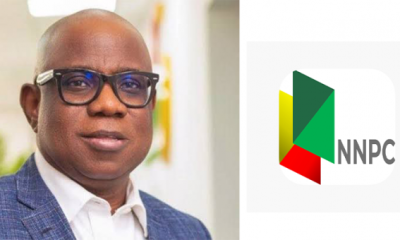Business
NNPC rules out sale of Port Harcourt refinery, insists on rehabilitation

The Nigerian National Petroleum Company Limited (NNPC Ltd.) has firmly dismissed speculation about the potential sale of the Port Harcourt Refining Company (PHRC), reaffirming its commitment to completing the ongoing multi-billion-naira rehabilitation of the plant and retaining it as a key national asset.
Group Chief Executive Officer of NNPC Ltd., Bayo Ojulari, made the clarification during a company-wide town hall meeting at the NNPC Towers in Abuja, amid growing public unease following his earlier remarks at the 2025 OPEC Seminar in Vienna, where he suggested that “all options are on the table” regarding the country’s refineries.
In an official statement issued on Wednesday, the company stated, “The Nigerian National Petroleum Company Limited has officially ruled out the sale of the Port Harcourt Refining Company, reaffirming its commitment to completing high-grade rehabilitation and retention of the plant.”
Ojulari described the idea of selling the Port Harcourt refinery as “ill-advised and sub-commercial,” noting that the facility remains strategic to Nigeria’s long-term energy security and economic stability.
The clarification comes after weeks of public debate and industry speculation, triggered by concerns that NNPC might offload the refinery following years of stalled rehabilitation efforts, mounting costs, and pressure to liberalise the downstream sector.
Ojulari stressed that the latest position is not a reversal but rather a product of ongoing technical and financial reviews across the Port Harcourt, Warri, and Kaduna refineries.
“The ongoing review indicates that the earlier decision to operate the Port Harcourt refinery before full completion of its rehabilitation was ill-informed and sub-commercial,” the statement noted. “Although progress is being made on all three, the emerging outlook calls for more advanced technical partnerships to complete and high-grade the rehabilitation of the Port Harcourt refinery.”
He added that any attempt to sell the facility at this point would amount to further “value erosion” and would undermine the government’s broader objective of revitalizing the domestic refining capacity.
Nigeria’s refineries have long been mired in controversy, dogged by decades of neglect, mismanagement, and corruption. Despite being Africa’s largest oil producer, the country has for years depended almost entirely on imported refined petroleum products, due to the near-total collapse of its local refining infrastructure.
The Port Harcourt refinery, once Nigeria’s flagship refining complex, has not produced at full capacity in over a decade. In 2021, the federal government approved a $1.5 billion rehabilitation project for the facility, with a projected completion timeline of 44 months. However, the project has suffered repeated delays and cost overruns, fuelling criticism and doubts over the viability of the investment.
Similar challenges plague the Kaduna and Warri refineries, which have remained largely dormant despite periodic budgetary allocations for turnaround maintenance, often with little to no measurable results. Critics have pointed to the billions of dollars spent on so-called “rehabilitation” efforts over the years without producing a single litre of refined product, describing the refineries as money pits.
In recent years, there have been calls for the government to privatise or concession the refineries to competent investors, as part of broader reforms to make the Nigerian downstream sector more efficient and self-sustaining. However, NNPC’s latest position signals a continued preference for retaining state ownership, albeit with potential private technical partnerships.
The debate over the future of state-owned refineries has also been influenced by the near-completion of the 650,000 barrels-per-day Dangote Refinery in Lagos. The privately-owned behemoth is expected to dramatically reduce Nigeria’s dependence on imported fuel and reshape the regional energy landscape.
With the Dangote Refinery poised to dominate domestic refining, questions have been raised about the economic rationale of continuing to fund public refinery rehabilitation, especially given Nigeria’s severe fiscal constraints and ballooning public debt.
But for NNPC, the issue goes beyond profit and loss. According to Ojulari, rehabilitating the Port Harcourt refinery is also about national energy security, employment generation, and maintaining strategic control over a key sector of the economy.
Still, experts caution that unless the rehabilitation is transparent, time-bound, and technically sound, it risks becoming yet another costly missed opportunity in the chequered history of Nigeria’s refining sector.






